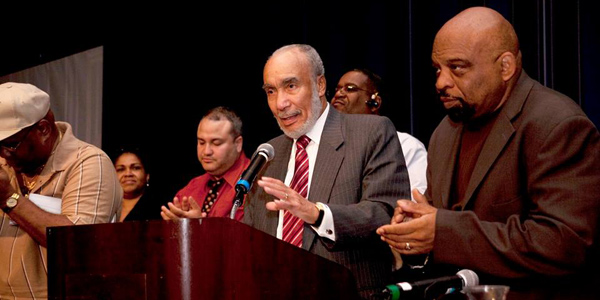Basil Paterson, Friend and Champion of Healthcare Workers, 1926-2014
April 20, 2014
The world’s working people have lost one of their great defenders.
Basil Paterson, who dedicated his life to the struggle for civil and labor rights, died on April 16 at Mt. Sinai Medical Center in New York City. He was 87. His wife, Portia, his sons, Daniel and David, and five grandchildren survive him.
Paterson was an unwavering supporter of 1199SEIU members. At various times in the 1970’s and 80’s, he served in a neutral role as mediator for the city and state of New York and helped negotiate several 1199 contracts with the League of Voluntary Hospitals and Homes. Afterwards he joined the law firm of Meyer, Suozzi, English & Klein, P.C., where he was co-chair of labor practice and served as the Union’s chief negotiator in talks with the League. In 1988, Paterson was instrumental in the historic campaign that increased minimum wages for some 60,000 New York City homecare workers by nearly 42 percent.
Paterson’s genius was noted in his ability to strategize and communicate workers’ concerns. He could cut through mired language and get to the bottom line for both sides. Paterson was courageous, steadfast and principled. He was unafraid to stand up for New York’s working people or to speak about the needs and conditions of the powerless. Paterson was also famous for his infectious warmth, wit and ability to bring people together. He shared an enduring, familial relationship with the members of 1199SEIU.
“Everybody knows that Basil was the nicest guy in New York City. He was smart, capable and a truly good person,” says 1199SEIU General Counsel Dan Ratner, who worked regularly with Paterson since the 1980’s. “The members were just in awe of him. He was enormously respected by the bosses as well. People would listen to what he had to say.”
Basil Alexander Paterson was born on April 27, 1926 in Harlem, N.Y. to West Indian- immigrant parents. He would go on to be lionized as a leader of New York’s civic and political life. In addition to advising more than 40 unions over the course of his legal career, Paterson served as New York State’s first African American Secretary of State under Gov. Hugh Carey, Deputy Mayor for Labor Relations and Personnel under NYC Mayor Ed Koch, and as a Commissioner of the Port Authority of New York and New Jersey, where he oversaw critical reforms. He was also a key advisor to his son David, who was New York State’s first African American governor from 2008 until 2010. He was also reported to be a fierce adversary on the basketball court.
Basil Paterson attended DeWitt Clinton High School in the Bronx and then enrolled at St. John’s University, which was then in Brooklyn. He left St. John’s after two years to serve in World War II. Upon his return from the war, Paterson completed degrees in biology and law and in 1953 married his wife, Portia, to whom he would be married for over 60 years.
With his Harlem law practice up and running, Paterson’s political star was soon on the rise. In 1964 he was elected as president of the N.A.A.C.P and in 1965, was elected to the New York State Senate, where he advocated for progressive political causes like a woman’s right to choose and special education.
Paterson made it clear that his journey was not without trial and indignity. He talked about the racism he encountered. Several years ago he spoke with The New York Times’ Bob Herbert about how he and other African-American packers at his first job, a Manhattan wholesale house, had been paid not to attend the company Christmas party so the celebration could remain segregated.
Basil Paterson was formed but not embittered by his experiences. His gentle, unapologetic fearlessness inspired those who worked with and learned from him. In June 2013, 1199SEIU helped establish The Basil Paterson Scholarship Fund for the Union’s homecare workers.
In a column that month for The Amsterdam News, 1199SEIU Pres. George Gresham said: “We at 1199SEIU consider Paterson one of the most beloved members of our family. To paraphrase, if we have been able to see far, it’s because we have stood on the shoulders of giants. Basil. A. Paterson is our giant.”
For this moment our hearts are heavy with the loss of one of our true giants; perhaps because of the tears in our eyes we struggle to see quite as far.


